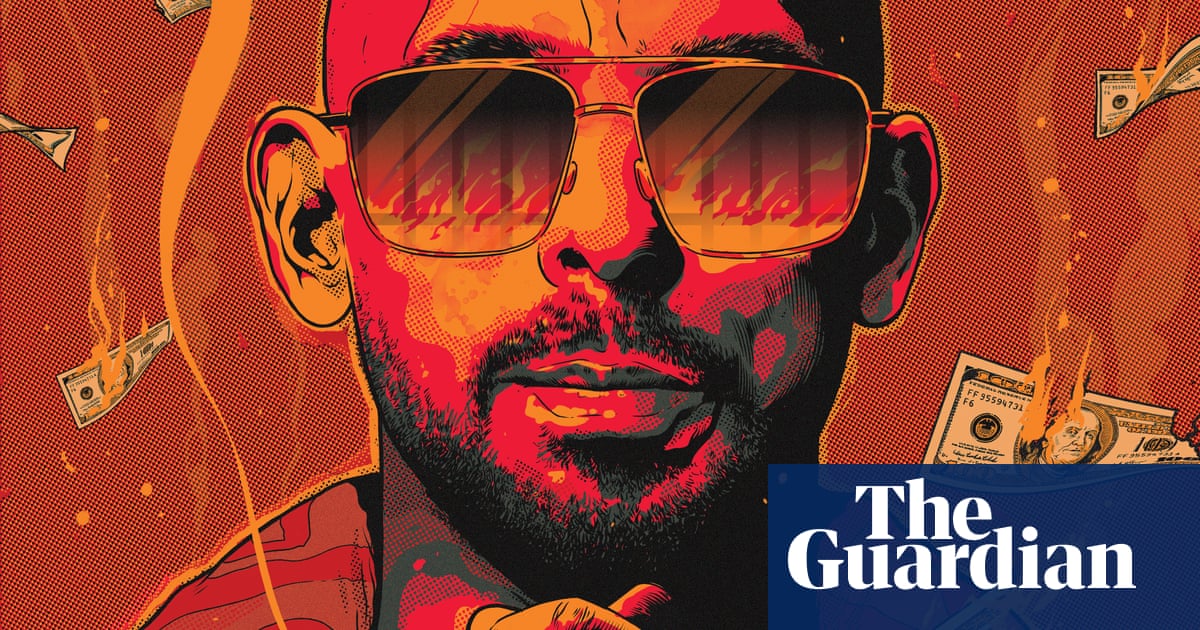The truth about Andrew Tate: ‘His home is less Hollywood hideaway, more rundown meat factory’
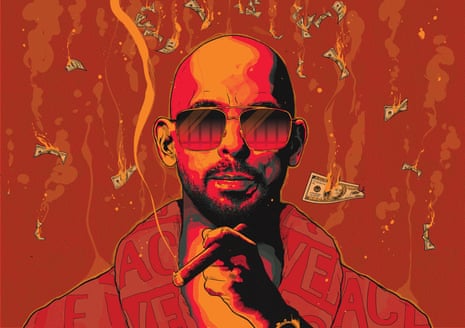
The former kickboxer has achieved global notoriety by peddling violent misogyny to millions, and claims to have made ‘trillions’ – but is his life of fast cars and luxury a facade?
Andrew Tate used to cruise along these scruffy suburban streets about 10 miles from the centre of Bucharest in Romania. Past a litter dump and a sprawling cemetery and a line of semis that wouldn’t have looked out of place on the TV soap Brookside. Rolling by in his Lamborghini or Bugatti or any other of his fleet of supercars. Puffing a cigar and adjusting his Michael Corleone sunglasses. Beating his tattooed chest at the red light.
Tate, who likes to call himself Top G (in street slang G stands for gangster), says he’s done nothing wrong. He might look and behave like a gangster. He might have boasted of gangsterish pursuits and claim to have made billions. But now, as a current guest of the Romanian penal system, he says he’s not an actual gangster at all. He says he’s a good guy.
His arrest on 29 December by armed members of Romania’s anti-corruption unit – the ones who arrest gangsters – was over allegations of people trafficking and rape. Officers wearing balaclavas stormed Tate’s compound by cover of night, and say they found guns, knives and large sums of cash. Top G and his younger brother, 34-year-old Tristan, were led away in handcuffs. Two Romanian women, Georgiana Naghel, and a former police officer called Alexandra Luana Radu, were also detained. The four are suspected of being part of a human trafficking group, although they say they are innocent.
I’m on my way to Andrew Tate’s home. I’d never heard of Tate until last summer. I usually cover wars, international crises, old-school corruption. Tate sounded like another self-obsessed attention screecher on social media. “He’s not,” said a colleague. “He’s one of the most Googled people on the internet. He gets more views on social media than Rihanna. Oh, and he told a Twitch Stream that he’s the world’s first trillionaire.”
But how could that be true? How does a former kickboxer from Luton convert notoriety on social media into his claimed Musk-scale wealth? And more pressingly, for Tate at least, what will the Romanian investigators discover about his money-making activities? If he is found guilty, he could be detained in a Romanian jail for the best part of 20 years.
Andrew Tate is a social media phenomenon. His content on TikTok has been viewed more than 12.7bn times. No one else on the platform comes close. He claims to have mastered the social media algorithms that sends posts ripping through cyberspace like a plague. He is a master of buzzwords, hashtags, soundbites and inflammatory language.
His career didn’t begin online – he was a kickboxer. A successful one. In 2009, he was ranked number one in his division in Europe. Commentators squawked about his “multilayered techniques” and “sharp punches to the body”. But by 2016 Tate had left the ring and entered another pugilistic arena, Big Brother. He appeared to be a born provocateur: “I don’t care if nobody likes me,” he told the other contestants. “I know I’m the most intelligent person in the house. Fact!”
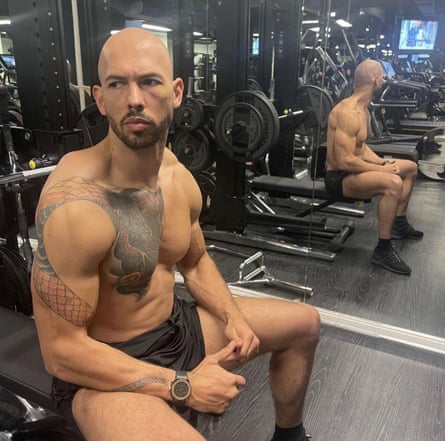
A few days later, Tate was thrown out after footage emerged of him beating an ex-girlfriend with a belt (although both Tate and the woman deny abuse and say the clip showed consensual sex). It’s since come to light that he was also being investigated by Hertfordshire police over allegations of rape. In 2019, the Crown Prosecution Service decided not to pursue the allegations.
Tate moved on. He set up a webcam business in the UK, streaming live sex shows featuring women he recruited. He grew his brand on social media, becoming Tate the “alpha male” influencer. He railed against radical feminism and declared that young men needed to seize back their masculinity. “Life is war,” he said. “It’s a war for the female you want. It’s a war for the car you want. It’s a war for the money you want. It’s a war for the status. Masculine life is war!”
Young, disaffected men began to follow him in their droves. They wanted more. Tate responded by ramping up the controversy. On social media, he talked about beating women, about grabbing them by the neck. Then in 2017, he declared that women who were raped bear some of the responsibility. Unsurprisingly, he was banned from all the major social media platforms in 2022.
In the last couple of years, it is Tate’s followers, not the man himself, who have helped to grow his presence on TikTok. They come from all social classes, creeds and countries. Having publicly converted to Islam in October last year, Tate was recently seen carrying a copy of the Qur’an to court in Romania, boosting his popularity among young Islamic men. Schools in the UK are so concerned about Tate’s radicalisation of their students that teachers are being given guidance on how to combat his misogynistic views.
Tate’s digital army of followers say his arrest in Romania is a setup, orchestrated by what they call “the Matrix” – a worldwide conspiracy of mainstream media and politicians who are trying to silence and control him. I’m part of the Matrix. You probably are, too. Anyone who thinks Tate’s brand of violent misogyny is a bad thing is part of the Matrix. “The Matrix has attacked me,” Tate tweeted after his arrest, “but they misunderstand, you cannot kill an idea.”
Undermining the protestations of his vast global fanbase (Tate fans took to the streets in Athens to protest his innocence) and doing little to help Tate’s defence are the bizarrely self-incriminating social media lectures that he has made over the years. Possibly useful when trying to burnish his gangster credentials for a credulous online audience, but less so when faced with a real-world Romanian prosecutor trying to prove you are involved in organised crime.
When Tate first arrived in Romania six years ago, aged 30, he was asked why he chose to relocate. “I like eastern Europe as a whole,” he said, “because corruption is far more accessible.” In the UK, he mused, only those of high status get away with crimes, implying that Romania was open to all.
Pushing through the gears, he then complained about how rape allegations in the UK were pursued a little too vigorously for his tastes – perhaps a reference to his own experience. “In western legal systems,” he said, “whether England, America, or any of them, if a girl says something she needs zero proof … and they will come and arrest you. It’s insanity and I thought, I can’t live under this system any more, so I had to move somewhere with common-sense rules.”
Those common-sense rules have led the Romanian prosecutor to keep Tate and his brother behind bars in what they call “preventive custody” to stop them fleeing, tampering with witnesses or igniting some kind of Trump-esque disruption at the Romanian courtrooms. The pair can be kept until the end of June. Then they must be released or put on trial. Romania has no jury system. If they are put on trial, judges will decide their fate.
The Romanian legal system has never experienced such global scrutiny, and the Tate brothers are already invoking the Matrix as the cause of all this. Leaving a failed appeal hearing in January, Tristan shouted to waiting camera: “Ask the politicians, ask the judges, you’re getting closer to the truth.”
I’m driving towards Tate’s pad, listening to a recording of him from a post that appeared on Twitter. It’s a tutorial, of sorts, delivered at a gallop in a mangled American-Luton accent: Tate was born in the US, his parents emigrating to the UK when he was about five. His father, Emory, was a trailblazing African American chess champion who died suddenly during a tournament in 2015. His mother used to work as a catering assistant in Luton and is now said to be in Kentucky, staying with Tate’s sister, a lawyer. Tate himself claims to have been a chess prodigy. I continue to listen to the recording as things take an ugly turn. “There’s no such thing,” he says, “as having girls who work for you who you’ve not fucked. It’s impossible. You have to fuck them, and they have to love you. It’s essential to the business, because otherwise women have no loyalty.”
Tate speaks about curing low self-esteem in young men – undoubtedly an issue – and tells his online audience to rise early, train at the gym, build their bodies and minds, push themselves to find self-actualisation. He says they’ll achieve nothing by sitting in front of their screens all day (I know – that’s where they’re watching him), and talks fiercely about the need to “suffer” in order to succeed, a reference to the years he spent in the kickboxing ring, where he says he saw people die.
The tutorial has moved on. Tate wants to teach his devotees how to recruit women into the webcam industry to feature in sexual content for which viewers pay between $2 and $10 a minute. Some receive a lot more. Romania has the biggest webcam industry in Europe – reputedly employing around 200,000 women – likely another reason Tate chose Bucharest as his home.
Tate’s voice fills my car. He’s explaining how to recruit women who are reluctant to undress in front of camera. “If you’re on dates and you try to mention [the webcam business], shit, it doesn’t work, it puts them off. You continue as normal,” he says. “No mention of webcam. You fuck the girl, after you’ve fucked the girl … then you start mentioning things like, ‘You’re always busy at work, you can come and work for me.’”
To close the deal, you should take her out to dinner with a webcam girl already in your employ who will help turn the screw. “Martinis, martinis, martinis,” he says, clinking imaginary glasses, “bang, threesome … put both girls on camera together the first day, give them a bottle of vodka.” The money will come pouring in, he says, and they’ll be hooked. “That’s how you recruit girls,” he says emphatically. “You can’t recruit girls any other way.”
You can imagine Tate’s legal team hearing the recording for the first time. It sounds like textbook psychological coercion. Tricking a woman into thinking she’s your girlfriend, then pressuring her to strip in front of a camera. In Romania, the authorities accuse him of the “loverboy” method. In the UK, it sounds like what we would call grooming.
We pull up on a patch of waste ground beside Tate’s home in the Pipera district of Bucharest, a mix of aspirational new villas and ugly post-communist blocks. Stray dogs bark in the distance. The gate is suitably masculine: heavy, black and sliding. The door into the compound looks like it might be bomb proof. Tate’s not there of course, but two of his heavies dressed in black suits patrol a modest pool, where I’ve seen Tate posing shirtless in online images.
Go around the side and you realise Tate’s home is less Hollywood hideaway and more like a rundown meat factory. Faux brickwork, dripping gutters, dark windows. There’s a pile of rubble where you’d expect the garden to be, and a broken Ikea lamp. Given the billionaire hype, and his regular postings about his private jets, ocean-going yachts, and his fleet of supercars, Tate’s residence is somewhat underwhelming.
There are plenty of exclusive neighbourhoods in Bucharest, crammed with beautiful villas. They’re equipped with tennis courts and pool houses and staff quarters, and they cost millions. If Tate really has the wealth he says he does, why doesn’t he live in Primaverii (Ceaușescu’s former neighbourhood), Kiselev, or Dorobanti? His followers say he needs to be “in hiding” in his weird lair to keep a low profile. But there are plenty of mafiosi in Bucharest who live in smart neighbourhoods and keep a low profile by not blurting out their every move on the internet or acting like “gangsters”.

Around the corner, on the Brookside estate, we’re told that Tate rents a semi for some of his webcam performers. We wander across, stumbling through a sodden building site. The house is neat, whitewashed, and in better order than Tate’s, although its jarringly small windows make it look like a custody centre. On the porch is a young woman.
Jasmina is a Romanian in her mid-20s, pretty and charming. She has a lot of tattoos. One, on her arm, says “Tate”. Others are branded in a similar way: “Tate’s girl” or “Tate’s property”. We meet a second woman the following day at the same address. She is branded too.
An ex-girlfriend of Tate’s in the UK claims she was manipulated by him. “Sophie” doesn’t want her real name out there because Tate’s followers can get quite nasty online. She says Tate first contacted her on Facebook. “There were no red flags at all in the beginning,” she says. “He just took an interest in my day-to-day life, wanted to know what I was into, what made me happy.” Sophie flew to Bucharest without ever having met Tate, excited about seeing her new boyfriend. She lived in the house with Tate and his brother. After a while, she says, Tate raised the issue of webcam work. “You should do it, you’d make a fortune – but if you don’t want to, you don’t have to.” Then she says the pressure started. “If you love me, you’d do it. If you care about me, you would do it.”
Sophie had done some modelling and pole dancing before, so she wasn’t a complete stranger to this world. It’s probably why he approached her in the first place. But she went to Bucharest to be Tate’s girlfriend, and fell in love with him. Then she says he started chipping away at her.
In the end, she agreed to the webcam work. She says she was under Tate’s spell. She would have done anything to win his approval. Sophie had never seen his online tutorial on how to convince women to perform on webcams.
One day, she says, he pinned her to the wall and slapped her hard. On another occasion, during rough sex, she says he strangled her until she passed out. Sophie is now assisting the Romanian prosecutor with the investigation. She is the first British complainant, and you can understand why she’s worried about a backlash.
The two branded women we meet at Tate’s rented house have been with him for years. They are both being treated as victims by the prosecutor, but both say they’re not victims at all. “I’ve never seen [either] of them being aggressive or rude. They’ve always respected people,” Jasmina told Romanian TV station Antena 1. Seemingly unaware of the possibility of psychological coercion, she told reporters: “The girls were never deprived of their freedom … the door was always open.”
If Tate is to be believed, his webcam business was extremely fruitful. He told a podcast that, at its height, he had 75 women working for him in four different locations, making him $600,000 a month. We found two of them in Bucharest. An insider at the Romanian prosecutor’s office said they certainly didn’t find the 75 webcammers that Tate claims.
In the centre of Bucharest is a former shopping mall converted to offices. On the sixth floor is Best Studios, one of the biggest and most successful webcam outfits in the city, with around 200 women on its books. One of its bosses, Maria Boroghina, shows me around the 40 or so bedrooms where large beds await the day’s activities. Smartly dressed in an expensive silk blouse, her hair cropped and bleached blond, she is a former webcam model herself, and made $20,000 a month back in 2012. Now in her late 30s, she’s the operations manager and travels the world representing Romania’s webcam industry, attending summits in Colombia and Portugal.
Maria knows everyone in the industry. Does she know Tate? Not until she saw his arrest on television. Is it possible he could have earned tens of millions from the webcam industry? “Oh!” she says, puzzled. “If he claims that, I would like him to come and train me, because we are not able to do that.” Then, more firmly. “It’s not realistic in this industry to win that much money with just a few models.”
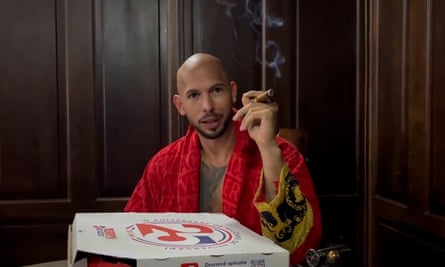
There are many more Tate companies, though. Perhaps he earned his trillion elsewhere. As we make calls to the company records office, we stop at a smart Bucharest coffee shop. Well-heeled teenage boys have congregated from a prestigious local high school. Have they heard of Tate? There is a rush of excitement. “The Top G!” A 16-year-old with a bookish air takes charge. “We love Andrew Tate,” he says, smiling. “He teaches us important lessons about life and things that we are not taught at school.”
Like what?
“Like how to act when you want to set up a business.”
Now, for the sake of completeness, there is more to Tate’s teaching than threesomes and vodka. Some of his site’s business advice is relatively orthodox. But it’s difficult to get beyond the misogyny.
I ask if they think bullying women is OK. “It depends on the girl really,” someone shouts. There’s laughter and a few whoops. “If you find an educated girl, then he won’t [bully] that girl … but if you talk to a whore … ” The boy shrugs his shoulders and gives me a knowing grin.
Romania is my spiritual home. I met my wife in Bucharest nearly 30 years ago. Back then, intolerance of all sorts was rife. Homosexuality could land you in jail. There has been huge progress, particularly since the country joined the EU in 2007. But traditional views on gender roles remain. It’s not unusual, or offensive to most, to be told that a woman’s place is in the home rearing children. Wives cook; husbands are fed. Men are expected to be tough and protective, and to look like men. Long hair is not much liked.
Sexual offences have not traditionally been a priority for the Romanian courts. Neither has human trafficking. Particularly if the accused is of high social status and the female complainant is not. That’s changing. But would the Romanian authorities have been pursuing this so assiduously if the Tate brothers’ first complainant had been a poor Romanian woman?
In fact, she was a US citizen. In April 2022, the brothers’ mansion was raided by police following a tipoff from the US embassy that a 21-year-old American woman was being held against her will. Police officers took the brothers away for questioning. They were soon released, but the raid and the information gathered were the catalyst for the brothers’ arrests just after Christmas.
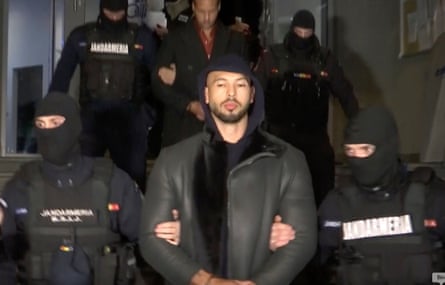
In Bucharest, we’re still following the money. And casinos are in the frame because Top G says he owns a chain of them. It’s a natural fit for Tate. “The story is,” he tells his followers in a video clip, “there were three brothers, mafia guys (naturally) who owned 400 casinos across eastern Europe. I went to them … ” He claims he got involved. Made a fortune. Designed a business model.
Tate says he owns a chain of 15 casinos and that they earn him $1m a month. Well, apparently not, according to the company records in Bucharest. We search high and low, and find no evidence that he owns a single casino. Not of the Bond and martini variety, at any rate. There is a weak historical link to a chain that operates slot-machine arcades, end-of-the-pier stuff. Yes, they’re known as casinos in Romania. But they’re not. That company is currently under investigation for alleged extortion and organised crime involving the Romanian mafia.
Tate has spoken before about owning some arcades in Romania in a business arrangement with the slot-machine arcades company. His tactic at one was to divert queues from a neighbouring Starbucks. He’d offer free coffee to tempt people inside, and they’d shove their lunch money into his one-armed bandits. Enterprising. But enough to earn him $1m a month?
Curiously, shortly after the police knocked on Tate’s door in April last year, it seems he offloaded a Romanian company called Groundbreaking Developments, a consultancy for business and management, and put it into the name of a woman who was later arrested as part of the same trafficking case. The company was transferred again to another woman, who turns out to be a pornographic actor from Grimsby. It has now been moved to Dubai, and we can’t see how much remains in its accounts.
It’s tough to find out how much Tate’s Romanian companies are actually worth. We can find tax returns for only one: Talisman Enterprises, listed as a web portal business. That has £1.2m of debt.
I tweeted about Tate’s finances recently, suggesting he may not have as much money as advertised. It received 2.3m hits and colourful responses from young men wearing Maga baseball caps. They thought they could detect the hand of the Matrix. I was called a moron, parasite, fake journalist and much worse.
One Tate business venture stands out as the likely source of his income. (It’s not as if Tate is on the breadline; something must explain the €3.6m worth of supercars and watches the Romanians say they seized from his home.) In 2021, Tate set up something called Hustlers University, which promised financial freedom through online tutorials with professors who are “world class multimillionaire experts”. The website looks like a Vin Diesel film. Explosions. Fireballs. Drifting Ferraris. But when you get into the meat of it, there appears to be some sound investment advice. The lecturers look like Bond villains. But they’re at Hustlers University. What do you expect? One has his face pixelated.
Hustlers University had an unorthodox recruitment method. Students were paid a cut of the subscription fee for any new student they managed to bring in. That provided Tate with a highly incentivised sales force overnight. If you think it sounds like a pyramid scheme, you wouldn’t be the first. Tate says it’s not.
Subscriptions cost $49.99 month. Tate claims he had more than 100,000 students. That seems a little far-fetched – one student said it was more like 30,000. But even that would have made Tate rich. Hustlers University has effectively rebranded and opened again as The Real World.
If Tate really does have immense wealth, I’m struggling to find it. There is one place we haven’t been able to look though, and that’s the blockchain. Tate regularly talks up crypto on social media, and in an October 2022 podcast he told listeners that he flipped a $600,000 bitcoin investment from March 2020, turning it into a $12m profit.
He does seem to have at least one digital wallet, but we can’t look inside. Romanian law enforcement can’t either, but they can track any transactions in or out. There’s legal precedent, at least, for them to freeze whatever’s there.
Back at Tate’s Bucharest compound, the supercars have long gone, seized by the authorities in connection with the investigation into alleged human trafficking. A neighbour wanders by loaded with shopping. “They’ve never done any wrong,” he says, gesturing at Andrew Tate’s home. “It’s the politicians behind all of this. They’re trying to stop him getting to his money.” Tate would doubtless agree.
He and his brother are not likely to be home for a while. The courts have until the end of June to start a trial or release them. An insider in the Romanian prosecutor’s office said they expect a trial to begin earlier than that, at which point the Tate brothers will be moved from a holding centre to a penitentiary, where conditions will likely be more severe. And the mood music isn’t good. The judge extended their detention in January referring to the brothers’ “capacity and effort to exercise permanent psychological control over the victims … including by resorting to constant acts of violence”.
If convicted, it’s possible they could be looking at many years in a Romanian jail. Tate, a man created in cyberspace, would see his money reduced to binary code locked in a virtual wallet that no human can reach.
Andrew Tate did not respond to a request to comment for this article.
